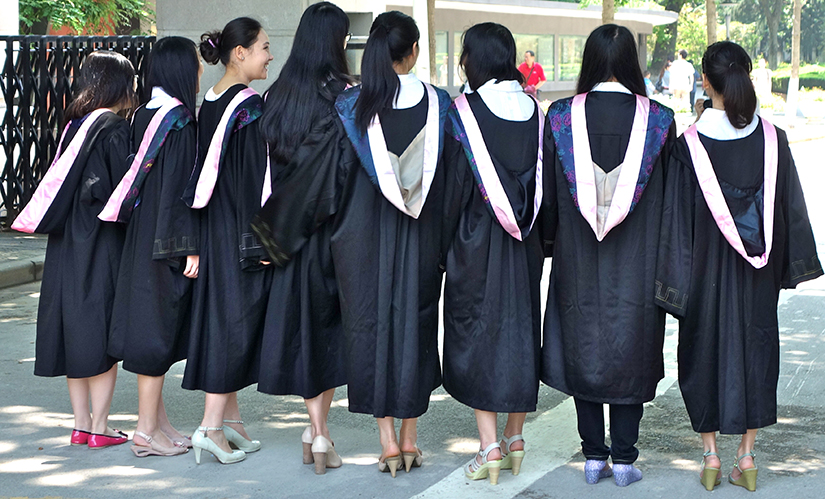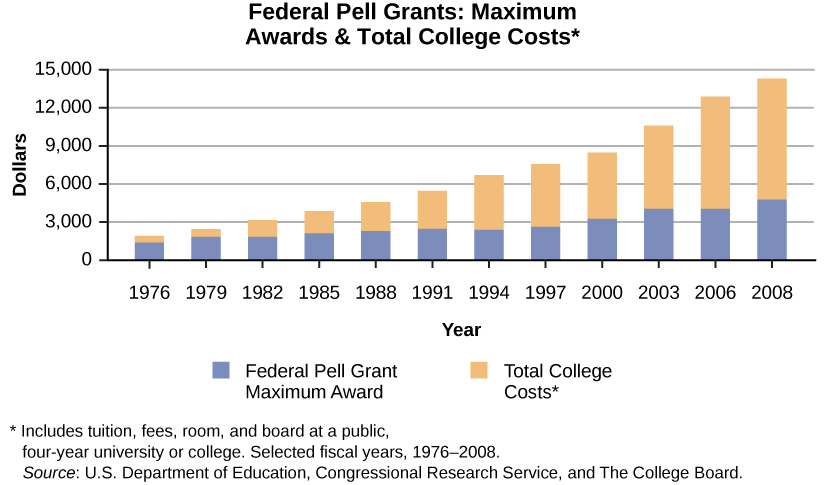
|

Introduction to education Read Online
16.1 Education around the world Read Online

"What the educator does in teaching is to make it possible for the students to become themselves" (Paulo Freire, Pedagogy of the Oppressed). David Simon, in his book Social Problems and the Sociological Imagination: A Paradigm for Analysis (1995), points to the notion that social problems are, in essence, contradictions—that is, statements, ideas, or features of a situation that are opposed to one another. Consider then, that one of the greatest expectations in U.S. society is that to attain any form of success in life, a person needs an education. In fact, a college degree is rapidly becoming an expectation at nearly all levels of middle-class success, not merely an enhancement to our occupational choices. And, as you might expect, the number of people graduating from college in the United States continues to rise dramatically.
The contradiction, however, lies in the fact that the more necessary a college degree has become, the harder it has become to achieve it. The cost of getting a college degree has risen sharply since the mid-1980s, while government support in the form of Pell Grants has barely increased. The net result is that those who do graduate from college are likely to begin a career in debt. As of 2013, the average of amount of a typical student's loans amounted to around $29,000. Added to that is that employment opportunities have not met expectations. The Washington Post (Brad Plumer May 20, 2013) notes that in 2010, only 27 percent of college graduates had a job related to their major. The business publication Bloomberg News states that among twenty-two-year-old degree holders who found jobs in the past three years, more than half were in roles not even requiring a college diploma (Janet Lorin and Jeanna Smialek, June 5, 2014).

Is a college degree still worth it? All this is not to say that lifetime earnings among those with a college degree are not, on average, still much higher than for those without. But even with unemployment among degree-earners at a low of 3 percent, the increase in wages over the past decade has remained at a flat 1 percent. And the pay gap between those with a degree and those without has continued to increase because wages for the rest have fallen (David Leonhardt, New York Times, The Upshot, May 27, 2014).
But is college worth more than money?
Generally, the first two years of college are essentially a liberal arts experience. The student is exposed to a fairly broad range of topics, from mathematics and the physical sciences to history and literature, the social sciences, and music and art through introductory and survey-styled courses. It is in this period that the student's world view is, it is hoped, expanded. Memorization of raw data still occurs, but if the system works, the student now looks at a larger world. Then, when he or she begins the process of specialization, it is with a much broader perspective than might be otherwise. This additional "cultural capital" can further enrich the life of the student, enhance his or her ability to work with experienced professionals, and build wisdom upon knowledge. Over two thousand years ago, Socrates said, "The unexamined life is not worth living." The real value of an education, then, is to enhance our skill at self-examination.
Leonhardt, David. 2014. "Is College Worth It? Clearly , New Data Say." The New York Times. Retrieved December 12, 2014. ( (External Link)&abt=0002&abg=1 ).
Lorin Janet, and Jeanna Smialek. 2014. "College Graduates Struggle to Find Eployment Worth a Degree." Bloomberg. Retrieved December 12, 2014. ( (External Link) ).
New Oxford English Dictionary. "contradiction." New Oxford English Dictionary. Retrieved December 12, 2014. ( (External Link) ).
Plumer, Brad. 2013. "Only 27 percent of college graduates have a job related ot their major." The Washington Post. Retrieved December 12, 2014. ( (External Link) ).
Simon, R David. 1995. Social Problems and the Sociological Imagination: A Paradigm for Analysis. New York: McGraw-Hill Education.
| Start Quiz | Download PDF | |
| Start Quiz | Download PDF | |
| Start Quiz | Download PDF | |
| Start Quiz | Download PDF |
Question: Which statement best expresses why there have been so few charismatic female leaders throughout history?
Choices:
Women have different leadership styles than men.
Women are not interested in leading at all.
Few women have had the opportunity to hold leadership roles over the courseof history.
Male historians have refused to acknowledge the contributions of femaleleaders in their records.
Question: Which statement best expresses the difference between power and authority?
Choices:
Authority involves intimidation.
Authority is more subtle than power.
Authority is based on the perceived legitimacy of the individual in power.
Authority is inherited, but power is seized by military force.
Question: Which of the following types of authority does not reside primarily in a leader?
Choices:
Dictatorial
Traditional
Charismatic
Legal-rational
Question: Which nation is an absolute monarchy?
Choices:
Oman
Great Britain
Denmark
Australia
Question: Which of the following present and former government leaders is generally considered a dictator?
Choices:
David Cameron
Barack Obama
Qaboos bin Said Al Said
Kim Jong-Un
Question: A(n) _________________ is an extremely oppressive government that seeks to control all aspects of its citizens' lives.
Choices:
oligarchy
totalitarian dictatorship
anarchy
absolute monarchy
Question: In the U.S. Senate, it is customary to assign each senator a seniority ranking based on years of government service and the population of the state he or she represents. A top ranking gives the senator priority for assignments to office space, committee chair positions, and seating on the senate floor. What type of authority does this example best illustrate?
Choices:
Dictatorial
Traditional
Charismatic
Legal-rational
Question: Malcolm X used his public speaking abilities and magnetism to inspire African Americans to stand up against injustice in an extremely hostile environment. He is an example of a(n) __________ leader.
Choices:
traditional
charismatic
legal-rational
illegitimate
Question: Many constitutional monarchies started out as:
Choices:
oligarchies
absolute monarchies
dictatorships
democracies
Question: Which current world figure has the least amount of political power?
Choices:
President Barack Obama
Queen Elizabeth II
British Prime Minister David Cameron
North Korean leader Kim Jong-Un
Question: Which is not a characteristic of a democracy?
Choices:
People vote to elect officials.
A king or queen holds the majority of governmental control.
One goal of this type of government is to protect citizens' basic rights.
A constitution typically outlines the foundational ideas of how this government should operate.